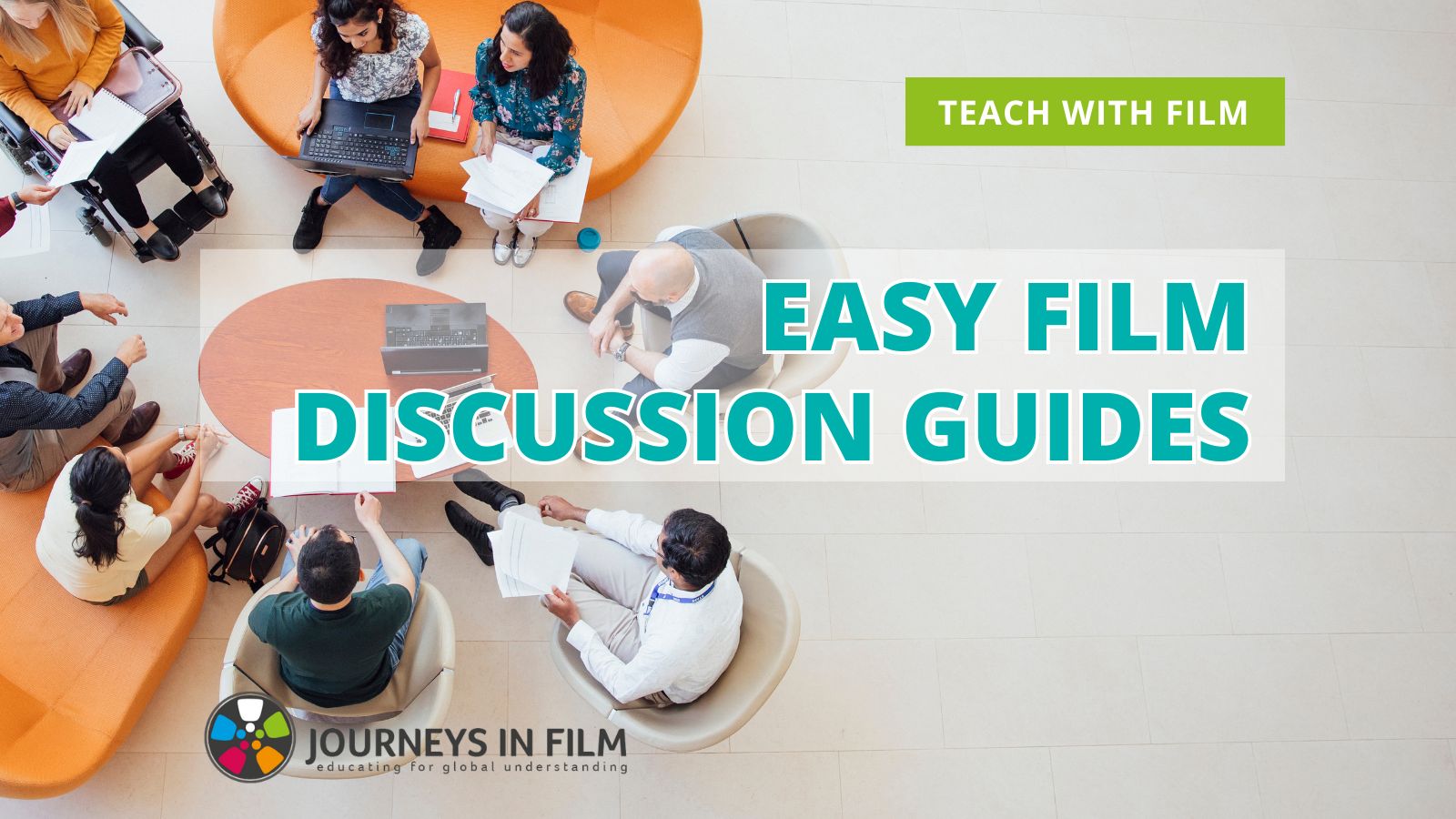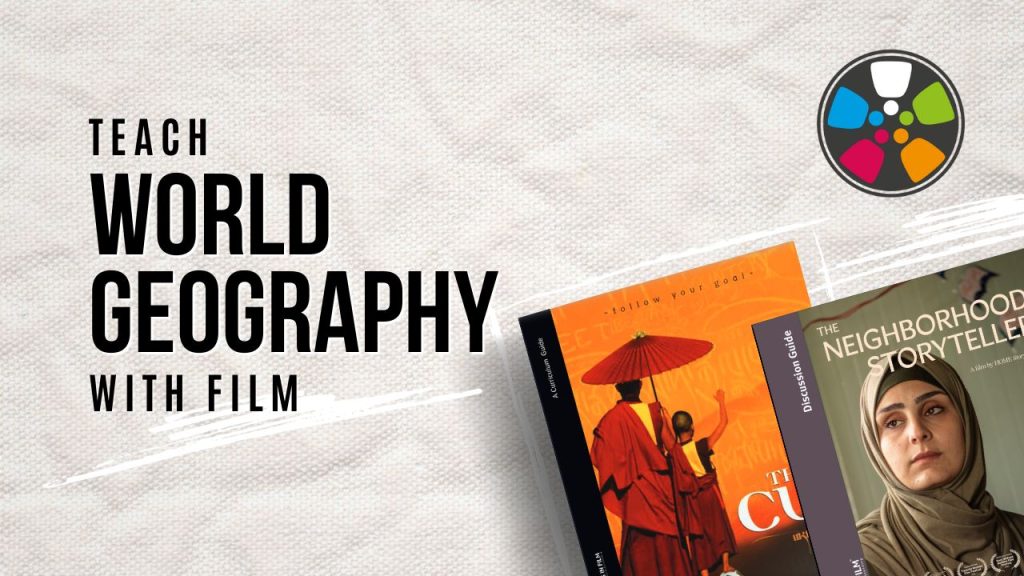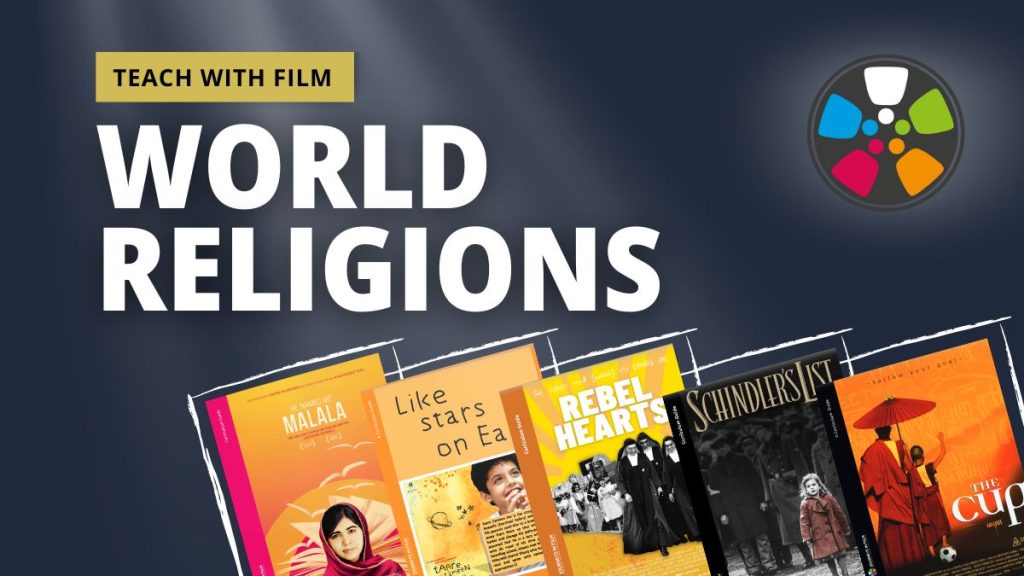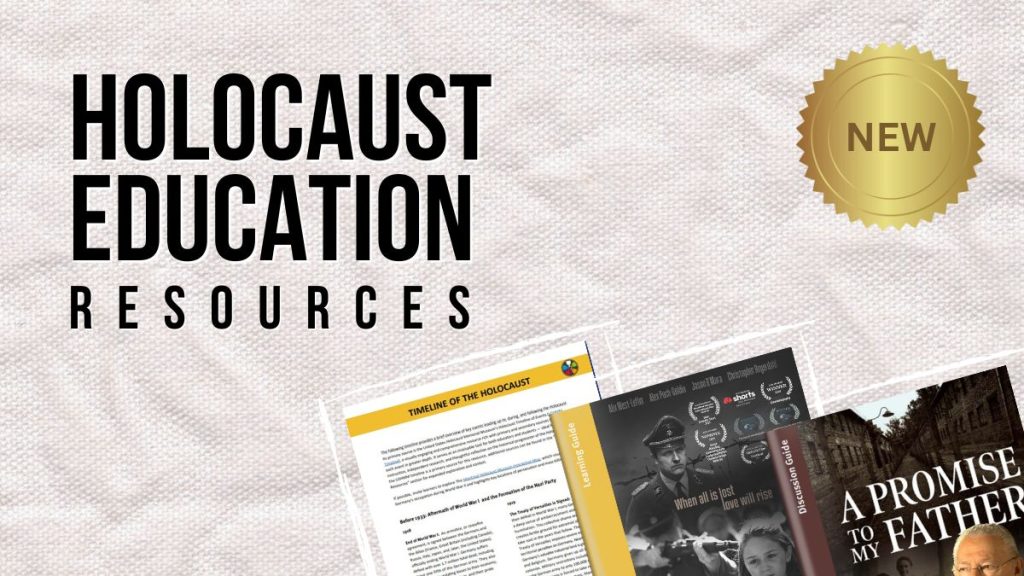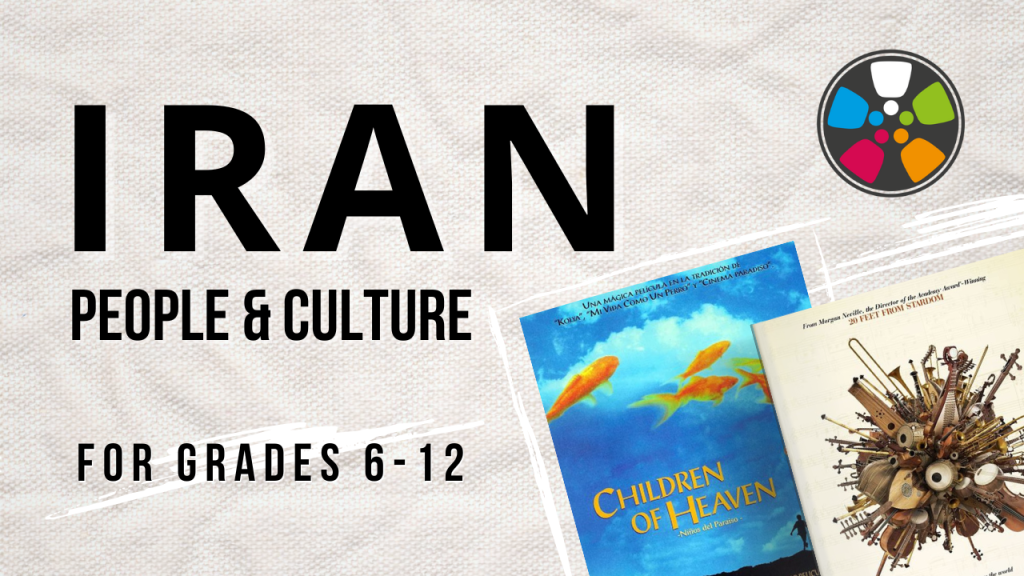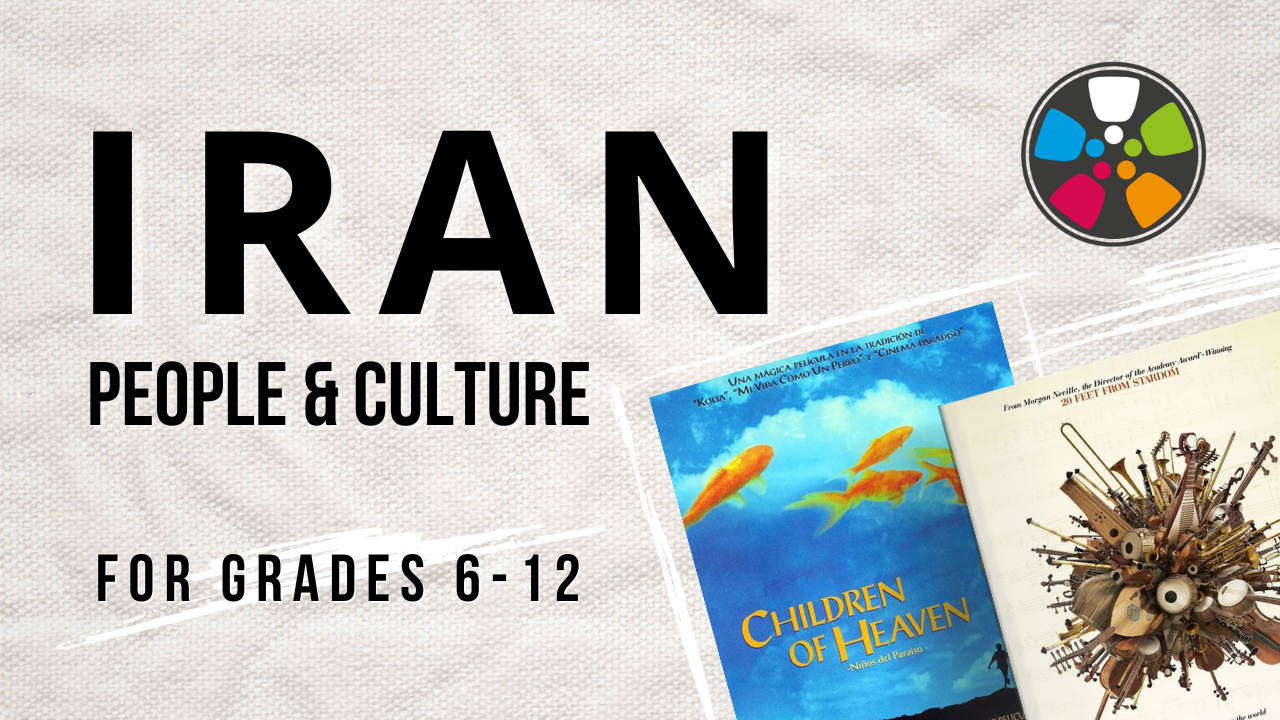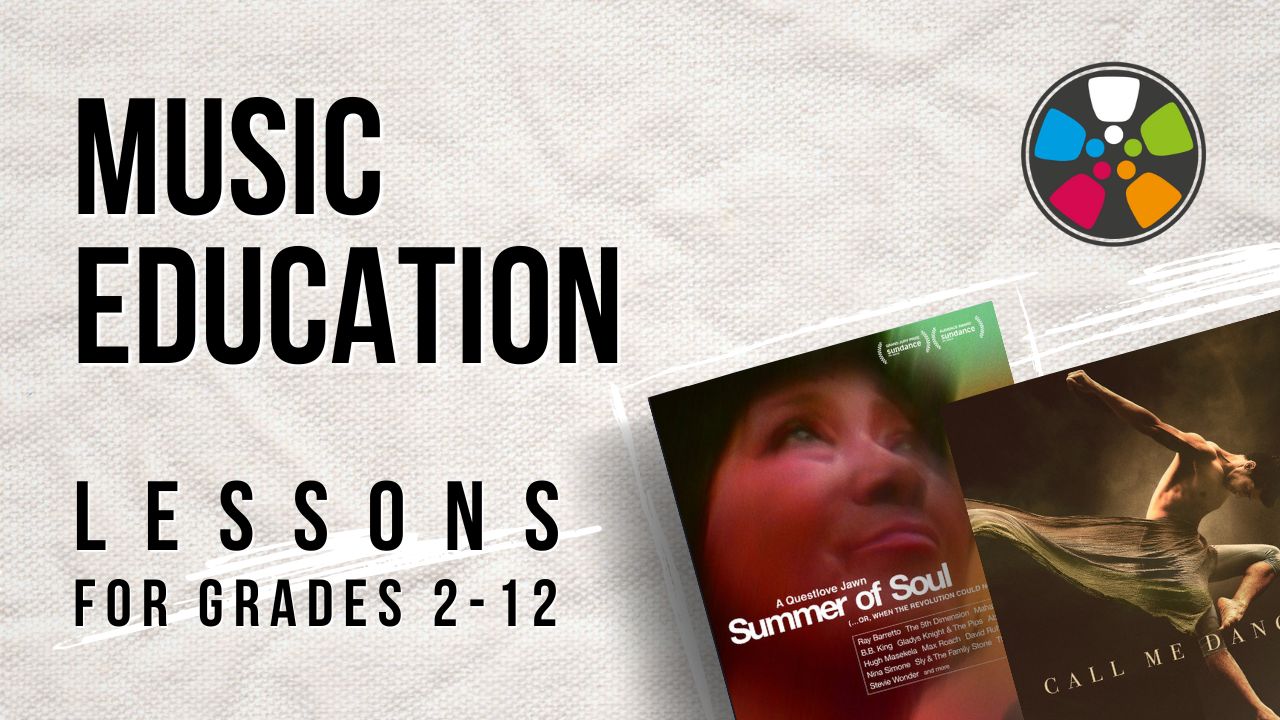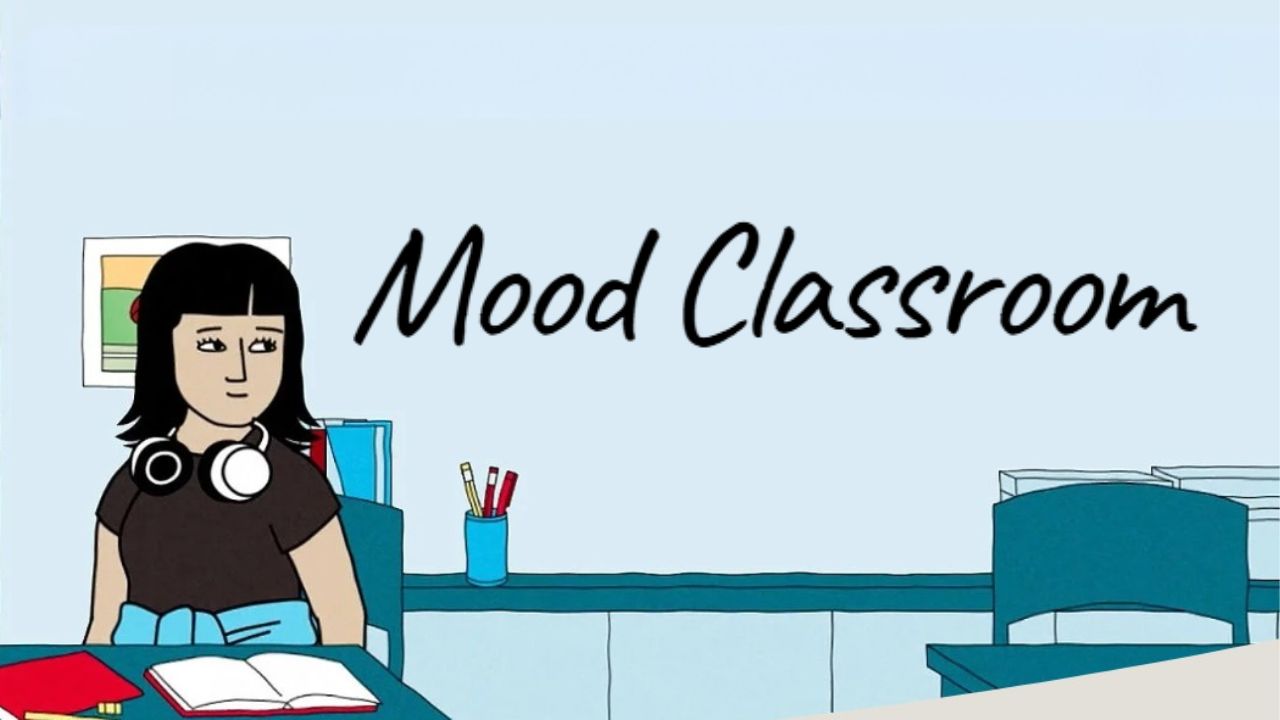Simplify your film screenings with film Discussion Guides from Journeys in Film! Our free Discussion Guides for award-winning films provide questions to encourage critical thinking, powerful discussion, and expanded understanding. Our Discussion Guides make hosting rousing discussions around film screenings to boost impact and engagement simple and easy.
Discussion Guide Frequently Asked Questions
Who are the Journeys in Film Discussion Guides for?
The Journeys in Film Discussion Guides are flexible by design to work in a wide range of situations: K12 classrooms and homeschooling, higher education, parenting / family film viewing, after school activities, library programs, community group and service club events, film clubs and doc clubs, and more.
How do educators use the Journeys in Film Discussion Guides?
Our film Discussion Guides are easy to use and require little to no advance preparation. They are great for sub days and end of term. They can also be incorporated into regular classroom use. They’re a flexible resource to keep tucked up your sleeve.
Can I use the Journeys in Film Discussion Guides on my own?
Yes! The questions in our Discussion Guides can serve as prompts for personal reflection, a viewer response journal, or for freewriting or creative writing.
Who makes the Journeys in Film Discussion Guides?
We work with teams of instructional designers, area experts and cultural consultants to create film-specific Discussion Guides with knowledge, care and attention. We do not use A.I. in the creation of our guides.
What kind of films does Journeys in Film create guides for?
We work with premier filmmakers to create Discussion Guides for award-winning social impact films. We develop Discussion Guides for films that don’t necessarily lend themselves to academic standards, but cover topics and themes that are valuable for classroom discussions and in other settings, such as after school clubs, community screenings, and university classes. Our film partners range from indie filmmakers to major studios like Disney.
Journeys in Film offers discussion guides for:
- Full length narrative films, like Hidden Figures;
- Short films, like Meshes of the Afternoon;
- Video series, like Finding Pride;
- Docu-Series, like The Invisible Shield;
- International films, like He Named Me Malala;
- Documentary films, like Greener Pastures and The Neighborhood Storyteller;
- Disney films, like Chevalier, Hidden Figures and Queen of Katwe;
- National Geographic series, like From The Ashes;
- Netflix films, like The Boy Who Harnessed the Wind and Youth v Gov;
- Steven Spielberg films, like Bridge of Spies;
- Oscar-winning films, like Navalny.
Why do some films have two guides?
Journeys in Film creates different kinds of guides to serve the needs of different kinds of learning environments.
- We also create Curriculum Guides, featuring teaching-ready lesson plans for classrooms, homeschooling and individual learners.
- For select films, we also create Learning Guides or Extended Discussion Guides, a type of film guide that digs even deeper into the material of a film and includes additional resources and extension activities.
Make sure you scroll all the way down each film page to see the full range of guides available.
Does Journeys in Film offer Discussion Guides in other languages?
Yes! We offer the following Discussion Guides in Spanish:
Can teachers and Book Clubs use the Journeys in Film Discussion Guides to discuss film and book tie-ins?
Yes! We recommend the following Discussion Guides for films that are based on books or have literary connections:
- Bridge of Spies and Strangers on a Bridge by James B. Donovan;
- Chevalier and African Europeans: An Untold History by Olivette Otele;
- Greener Pastures and Of Mice and Men by John Steinbeck;
- He Named Me Malala and Malala Yousafzai’s memoir I am Malala;
- Meshes of the Afternoon and The Yellow Wallpaper by Charlotte Perkins Gilman;
- Navalny and Alexei Navalny’s posthumous memoir Patriot;
- Queen of Katwe and The Queen of Katwe: One Girl’s Triumphant Path to Becoming a Chess Champion by Tim Crothers;
- The Boy Who Harnessed The Wind and The Boy Who Harnessed the Wind: Creating Currents of Electricity and Hope by William Kamkwamba and Bryan Mealer, also available in Young Reader and Picture Book editions;
- The Neighborhood Storyteller and Muzoon: A Syrian Refugee Speaks Out by Muzoon Almellehan and Wendy Pearlman.
How much do Journeys in Film Discussion Guides cost?
Like all of our resources, our Film Discussion Guides are free for everyone.
Journeys in Film Discussion Guides are free? Really?
Yes.
Where can I find the Journeys in Film Discussion Guides?
Check out our Discussion Guides along with all our film resources in the Journeys in Film Library.
Many of our Discussion Guides are also available through Share My Lesson.
What if I want Journeys in Film to make a Discussion Guide for my film?
Learn more about how Journeys in Film partners with filmmakers and then get in touch with us.
Does Journeys in Film offer Discussion Guides for Documentaries?
Yes! We offer discussion guides for award-winning documentaries from around the world. See the full Journeys in Film Discussion Guide Index below.
Does Journeys in Film offer Discussion Guides for Narrative Films?
Yes. We offer Discussion Guides for narrative films like Bridge of Spies, Chevalier, Hidden Figures, Queen of Katwe, and The Boy Who Harnessed The Wind.
Does Journeys in Film offer Discussion Guides for Docu-series?
Yes. We offer Discussion Guides for docu-series like Genius, The Invisible Shield, The Story of God, and The Story of Us.
Does Journeys in Film offer Discussion Guides for films under one hour?
Yes. We offer Discussion Guides for several films under one hour, including Finding Pride, Meshes of the Afternoon, The Neighborhood Storyteller, and Unzipped. Check out the Discussion Guide Index by Running Time at the bottom of this article to find discussion guides for films based on length.
Does Journeys in Film offer Discussion Guides for elementary school use?
Yes, We offer Discussion Guides for films and series suitable for ages 8-12. See the Discussion Guide Index by Age Group below.
Does Journeys in Film offer Discussion Guides for middle school use?
Yes, We offer Discussion Guides for films and series suitable for ages 12-15. See the Discussion Guide Index by Age Group below.
Does Journeys in Film offer Discussion Guides for high school and higher education use?
Yes. Almost all of our films are appropriate for ages 14+. See the full Journeys in Film Discussion Guide Index below or individual film listings in the Journeys in Film Library.
Journeys in Film Discussion Guide Index by Age Group
Ages 8 and up
Jane — documentary, 1 hour 30 minutes.
Ages 10 and up
Hidden Figures — narrative film, 2 hours 7 minutes.
Queen of Katwe — narrative film, 2 hours 4 minutes.
The Neighborhood Storyteller — documentary, 49 minutes.
Ages 11 and up
Golden Age Karate — documentary short, five minutes.
Greener Pastures — documentary, 1 hour 25 minutes. *Also available in Spanish: Greener Pastures Guía de discusión.
The Boy Who Harnessed The Wind — narrative film, 1 hour 53 minutes,.
Ages 12 and up
From The Ashes — documentary, 1 hour 22 minutes.
He Named Me Malala — documentary, 1 hour 28 minutes.
The Invisible Shield, — docu-series, 4 episodes, 54 minutes each.
Ages 13 and up
A Towering Task — documentary, 1 hour 53 minutes.
Bridge of Spies — narrative film, 2 hours 22 minutes.
Chevalier — narrative film, 1 hour 47 minutes.
Finding Pride — short video collection, each video is 2-10 minutes.
Gabby Giffords Won’t Back Down — documentary, 1 hour 37 minutes. *Also available in Spanish: Gabby Giffords Won’t Back Down Guía de discusión.
Navalny — documentary, 1 hour 38 minutes..
The Story of God with Morgan Freeman — docuseries, six episodes, 42 minutes each.
Ages 14 and up
Meshes of the Afternoon — short film, 14 minutes.
The Story of Us with Morgan Freeman — docuseries, six episodes, 60 minutes each.
Unzipped: An Autopsy of American Inequality — documentary, 51 minutes.
Youth v Gov — documentary, 1 hour, 50 minutes.
Ages 15 and up
Crip Camp — documentary, 1 hour 42 minutes.
Genius — docu-series, 10 episodes, 45-60 minutes each.
Adult / Mature Audiences
Safe Place — documentary short, 20 minutes, mature audiences.
Journeys in Film Discussion Guide Alphabetical Index by Running Time
Under 15 Minutes
Finding Pride — short video collection, each video is 2-10 minutes, ages 13+.
Golden Age Karate — documentary short, five minutes, ages 11+.
Meshes of the Afternoon — short film, 14 minutes, ages 14+.
15-29 Minutes
Safe Place — documentary short, 20 minutes, mature audiences.
30-59 Minutes
Genius — docu-series, 10 episodes, 45-60 minutes each, ages 15+.
The Invisible Shield, — docu-series, 4 episodes, 54 minutes each, ages 12+.
The Neighborhood Storyteller — documentary, 49 minutes, ages 10+.
The Story of God with Morgan Freeman — docuseries, six episodes, 42 minutes each, ages 13+.
Unzipped: An Autopsy of American Inequality — documentary, 51 minutes, ages 14+.
1 Hour to 2 Hours
A Towering Task — documentary, 1 hour 53 minutes, ages 13+.
Chevalier — feature film, 1 hour 47 minutes, ages 13+.
Crip Camp — documentary, 1 hour 42 minutes, ages 15+.
From The Ashes — documentary, 1 hour 22 minutes, ages 12+.
Gabby Giffords Won’t Back Down — documentary, 1 hour 37 minutes, ages 13+.
Greener Pastures — documentary, 1 hour 25 minutes, ages 11+.
He Named Me Malala — documentary, 1 hour 28 minutes, ages 12+.
Jane — documentary, 1 hour 30 minutes, ages 8+.
Navalny — documentary, 1 hour 38 minutes., ages 13+.
The Boy Who Harnessed The Wind — feature film, 1 hour 53 minutes, ages 11+.
The Story of Us with Morgan Freeman — docuseries, six episodes, 60 minutes each, ages 14+.
Youth v Gov — documentary, 1 hour, 50 minutes, ages 14+.
Over 2 Hours
Bridge of Spies — feature film, 2 hours 22 minutes, ages 13+.
Hidden Figures — feature film, 2 hours 7 minutes, ages 10+.
Queen of Katwe — feature film, 2 hours 4 minutes, ages 10+.
Get Our Newest Guides
Don’t miss the launch of our new film Discussion Guides. To receive notifications about our new releases, sign up for the Journeys in Film newsletter.

